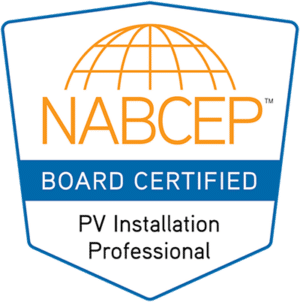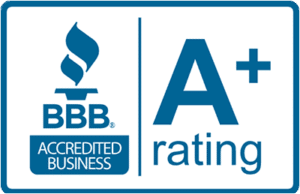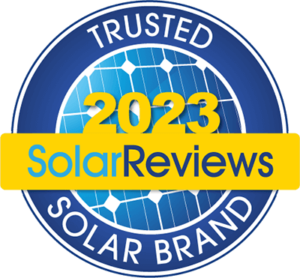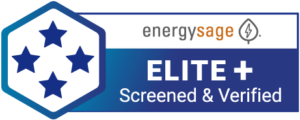- Why Solar
- FAQs
Frequently Asked Questions About Solar
Solar Energy Basics
Solar energy is increasing in popularity as more and more people consider solar panels to power their homes or businesses. Here are some of the most basic questions that we get asked about solar.
How do solar panels work?
The sun shines down on the solar panels. Inside the panels, photons cause electrons to separate from their atoms and create direct current (DC) energy. A device connected to the solar panels called an inverter then transforms this DC power into the alternating current (AC) we use as electricity. From there, the electricity produced by solar panels enters our homes and businesses the same way electricity from the local power grid does.
How long do solar panels last?
A solar panel’s current estimated lifespan is 35–40 years, which falls in line with the lifespan of most premium residential roofing materials. However, most manufacturers recommend that their panels be replaced when the panel efficiency drops below 80%—typically around the 25 to 30-year mark—which is well beyond the estimated payback period for your solar photovoltaic investment.
How much do solar panels cost?
It’s impossible to set a one-size-fits-all price on solar installation. Each property has its own energy needs and design configurations to take into account. How many panels are needed to cover all the energy requirements for the property? Can that number of panels fit on the roof? Should ground-mounted solar be a consideration? Are there trees or other larger buildings nearby that could cast a shadow on your panels? The only way to find out how much solar panels could cost for your property is to get a custom evaluation.
Will solar power save me money?
That’s a tricky question because people and properties have different energy needs and configurations. Solar might not always be feasible for all properties. Some people may have such low energy needs that switching to solar doesn’t make sense. In many cases, switching to solar panels can save a homeowner hundreds of dollars yearly and businesses could potentially save thousands on energy costs. The only way to find out one way or another is to get a custom solar evaluation.
Can solar power my whole property?
This depends on your individual energy needs and your property’s unique features. In many cases, solar energy systems can be designed to cover all of a property’s daily energy needs. That said, sometimes it’s also worthwhile to install a solar array that partially covers the property’s energy needs. Even a small system can help a property owner save money or reduce their carbon footprint.
How long does it take for solar energy to pay for itself?
That depends on a variety of factors, including the size of the proposed location for the solar panels, energy usage of the property, solar incentives, net metering agreements, and more. Typical timeframes can range between eight to 15 years but could be sooner. When your solar project is designed, it will include a customized payback timetable.
Solar Power Myths
Solar energy has its share of myths. Many “new” or novel products and services are surrounded by misinformation, which is usually based on assumptions, not facts. Believing these myths could be costing you money.
Is solar power really expensive?
When it comes to the expense of getting started with a solar installation, you won’t need to come up with a big down payment. In fact, often times you won’t have to come up with anything because many financing options for both residential and commercial solar projects offer installations for zero money down.
Are the Midwest and Northeast states too cold and snowy for solar?
There isn’t a significant sunlight difference between some traditionally “warm-weather” regions and some “cold-weather” regions. Minneapolis has the same number of sunny days as Jacksonville, Florida. Boston has a similar number of sunny days as Birmingham, Alabama. The Midwest and the Northeast get plenty of sun, and various government incentives for installing solar make the deal that much more attractive.
If I don’t use all the energy I generate, doesn’t it just go away?
Many utilities offer net metering, a process by which the excess energy from your solar panels is sent back into the grid in exchange for credits on your utility bill. Thanks to net metering, you can over-produce electricity during the sunniest times of the year and have a surplus of credits to fall back on when your system is in a low-production mode.
Am I better off waiting for the price of solar to drop?
This myth stems from the idea that the cost of solar installations will continue to decrease. While it’s true that costs have dropped significantly over the years, recent manufacturing and supply chain volatility has proven that we can’t expect prices to always decrease. Even as technology increases efficiency, the prices charged by installers and component manufacturers can only go so low. Waiting could also mean missing out on incentives that make solar more affordable.
Will solar panels damage my roof?
This myth likely arose from isolated incidents in which solar panels were incorrectly installed on roofs that were already compromised. The truth is, properly installed solar panels (i.e., connected to the rafters) actually help to strengthen the roof by providing extra bracing support. A good installer will send out engineers to inspect every inch of your roof. A credible firm would never set up panels on a faulty roof.
Is switching to solar complicated and difficult?
If you were to purchase all the PV system components, learn how they work and then perform the installation yourself, “complex” and “confusing” definitely would be two words to describe your experience. Fortunately, you don’t have to do this. All Energy Solar has a proven process to make switching to solar easy. We’re ready to guide you through the complexities and will walk you through each step of the path to your solar dreams.
Download our Making the Switch to Solar eBook to learn more.
Solar for Business
Solar power is surging within the commercial market as business owners learn more about the multiple benefits of solar energy. Here are some of the most common questions about solar for business.
Why should my business consider commercial solar?
Solar helps your business reduce operating costs by lowering the monthly energy costs to keep the property running. These returns are realized for decades and increase as retail rates rise from utility providers. There are also generous upfront tax incentives and depreciation credits, which help most projects lead to payback in a few years rather than a few decades, as with other types of capital investments. Renewable energy investments are very promotable and drive awareness around the business’ commitment to clean energy and overall energy efficiency which all contribute to employee retention and customer loyalty.
What are the financial benefits of commercial solar?
Commercial solar systems reduce electricity bills by offsetting a building’s energy use with power generated from solar panels. This offset can result in significant savings across the lifetime of the system (40-50 years), helping the business to lock in energy costs for decades to come. Electricity rates have risen consistently over the last 20 years and this trend is expected to continue to a greater degree than ever before. Commercial solar installations protect against rising energy costs from the day the system is turned on through the end of the system’s lifespan, yielding decades of predictable clean energy savings for the business.
What are the environmental benefits of commercial solar?
Solar’s environmental impact on the communities around us and the world at large is now more important than ever, and many businesses are looking forward to committing to a more sustainable future through increased clean energy investment.
Businesses can reduce greenhouse gas emissions by using solar energy to offset fossil fuel-based electricity provided by most utilities, which reduces air pollutants like sulfur dioxide, carbon dioxide, and particulate matter, which have been shown to cause health problems and contribute to the climate crisis.
What incentives are there for commercial solar?
Incentives for commercial solar are varied, and can depend on project type, location, participating business or other utility offerings. Various federal and state government programs support businesses that choose to invest in solar energy through a variety of solar credits, rebates, and other incentives.
- The 2022 Inflation Reduction Act (IRA) was a critical piece of bipartisan legislation passed recently that has bolstered tax benefits for all kinds of potential system owners here in the US.
- Property Assessed Clean Energy (PACE) is a financing program that offers qualifying businesses interested in solar access a low-interest, short-term loan with deferred payments to improve cash flow.
- The Rural Energy for America Program (REAP) offers grants to farms and businesses in rural communities to invest in renewable energy systems and energy efficiency improvements.
There may also be additional incentives offered by your local community or even utility provider, all of which your solar partner can help identify.
Certain incentives are also available for nonprofits now through the IRA, opening the door to improved returns for many properties that were previously exempt from earning any federal funding towards renewable energy system investments.
What types of buildings are compatible with solar?
You must own the building or gain approval from the building owner to install solar on your commercial property. After that is taken into consideration, nearly any building can be suitable for solar, so long as the roof is structurally sound and has enough space for panels and the racking needed to mount them. For properties with limited roof space, ground-mounted systems or solar carports can be a good alternative as well.
What types of businesses are switching to solar energy?
Businesses of all sizes and in varied industries are switching to solar energy. From local corner stores and family-owned farms to companies with locations across multiple states and international brands, the value that can be found in clean and sustainable energy solutions is not restricted by categories or borders.
Nonprofits are also switching to solar, now that rules and incentives have been updated. Solar can really be for any business, but the only way to find out is to get a professional evaluation from a solar expert.
Solar + More
Solar panels are great, but what about solar, plus additional features? Solar + Battery Storage, Solar + EV Charger, Solar + Roofing, here are some of our most common questions about Solar + More.
Why do I need Solar + Battery if I want to have electricity during a power grid failure?
Most solar energy systems, whether they include a battery or not, are connected to the grid. This connection allows solar panel owners to “sell” excess power produced by their systems back to the grid for credits on their future energy bills. During a power failure, a grid-connected solar system with no battery will shut down. This is a safety feature so utility electricians can fix issues without the risk of unexpected energy from solar hitting the powerlines. With Solar + Battery, the solar panels and battery can work together independently during a power outage and keep your lights on, regardless of whether the grid is online.
How long can a solar + battery power my property when the grid goes down?
The answer to this depends on a variety of factors, including how much energy the property consumes in a given day, the battery capacity power rating, what loads the battery will help support, the quantity of batteries and more. A battery or bank of batteries should be sized to keep your home running until the grid comes back online. When it comes to Solar + Battery for business, if your operations are energy intensive, you may need to pick and choose which systems are vital to be kept running when the grid goes down.
Why would I want to get Solar Panels with an electric vehicle charger?
As more people are considering the move to fully electric vehicles, the need for private electric vehicle charging stations is on the rise. What better way to generate that EV power than with solar? It’s a great opportunity to kick fossil fuels to the curb at home and on the road. Businesses with Solar + EV Chargers can promote these features as benefits for employees to use when onsite at your property and attract customers for longer stays.
Can I install just enough solar panels to charge my EV?
Yes, it can take anywhere from 5 to 12 solar panels to generate enough energy to keep your EV charged, but that figure can depend on a variety of factors. The only way to know is to get a Solar + EV Charger evaluation from an installer experienced with these types of projects.
Does All Energy Solar offer Solar + Roofing everywhere?
Unfortunately, no, but that could change in the future. If your property is within 80 miles of All Energy Solar’s St. Paul, Minnesota headquarters, we can help you with a roof replacement or repair prior to solar panel installation. If your property is outside of this radius, you will want to work with a trusted roofer to replace or repair your roof.
What if I live outside of your roofing service area but need my solar panels removed and reinstalled?
If your property is outside of our Solar + Roofing radius, or you want to work with a roofer you already trust, we can work with the company of your choice to ensure that your solar panel removal, repair, and reinstallation needs are completed in a way that preserves the warranties associated with your solar array(s).
Certified and Trusted Experts




